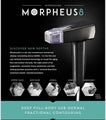Does laser hair removal work for Polycystic Ovary Syndrome?
Does Laser Hair Removal work for Polycystic Ovary Syndrome (PCOS)?

“ Thicker, darker hair has more melanin and so more energy can be absorbed and unlike waxing and shaving, once the hair follicle is killed, the hair doesn’t grow back”
Does laser hair removal work for PCOS?
Yes, laser hair removal may work better on hair that is thicker and darker because of Polycystic Ovary Syndrome. When we treat hair with a laser, we’re targeting pigment in the hair shaft, deep in the follicle. Although you’ll be shaved for your treatment, the small amount of hair still located in the skin will absorb the light and transfer it to heat within the follicle, "denaturing" or killing it forever. Thicker, darker hair has more melanin, so more energy can be absorbed, and unlike with waxing and shaving, once the hair follicle is killed, the hair doesn’t grow back.
Alexandrite Laser is most effective on light-colored skin. If your skin is pigmented, Nd:YAG is the only safe option.

“the cumulative effect of monthly treatments increases the length of time each patient is hair free”
How many sessions?
Of course, there are always complications. Each one of your individual hairs is somewhere along its lifecycle, and it’s only during the growth stage (see my other article about this) that real hair removal happens. During the growth stage, your hair is still attached to the follicle, meaning heat can be easily transferred down the hair shaft and into the follicle to stop future growth.
On average, only about 30% of hair will be in this growth stage, but even the hair not in the growth stage can be fully removed from the follicle (sometimes visibly) by the laser treatment, leading to a longer hair-free period. In fact, with laser hair removal, you might have a blissful few 2-3 weeks with heavily reduced hair growth.
We're born with all the hair follicles we'll ever have, but PCOS, hormones, medications, and age will activate new follicles, so while we usually recommend a course of 10 to 12 treatments for most people, it’s difficult to recommend the number of treatments for someone with active PCOS or going through the menopause.
A study in 2007 found that although laser hair removal works less effectively for PCOS patients, 95% of those questioned were happy with the results. Of the 60 participants in the study who underwent laser hair removal with an Alexandrite Laser, 2.6% had a hair-free interval of 6 weeks after just 6 treatments, but this rose to 31% of the participants after 12 treatments. The study shows that the cumulative effect of monthly treatments increases the length of time each patient is hair-free.
This study was completed over a decade ago, and laser technology has developed a great deal since then; our latest Motus AY by DEKA is the world's only "true" alexandrite (all the others are actually diodes) and gets far better results, even with less pigmented hair (red and blond), than previous generations of Alexandrite, so there’s never been a better time to start treating PCOS hair growth.
“ If your hair is white or has nearly no pigment this is going to be the best option for you. For larger areas we would always recommend at least trying our lasers first”
What about electrolysis for PCOS?
Electrolysis kills the hair follicle by putting a probe into the follicle and applying energy directly to it. Instead of light being turned into heat, an electrical current is used.
Before lasers were invented, it was thought to be the best way to get rid of hair for most people. However, it’s a slow process, and a study from 2000 explains why we don't recommend it when it can be avoided; according to the study, electrolysis is 60 times slower than laser, more painful, and less reliable.
However, if your hair is white or has nearly no pigment, this is going to be the best option for you. For larger areas, we would always recommend at least trying our lasers first; old and cheap imported lasers (people really do buy them on Ebay) are nothing compared to the latest generation of medical grade technology.
“ IPL is old technology when it comes to hair removal and any clinic providing it is stuck in the past.”
Do home IPL machines work for PCOS?
What's next?



